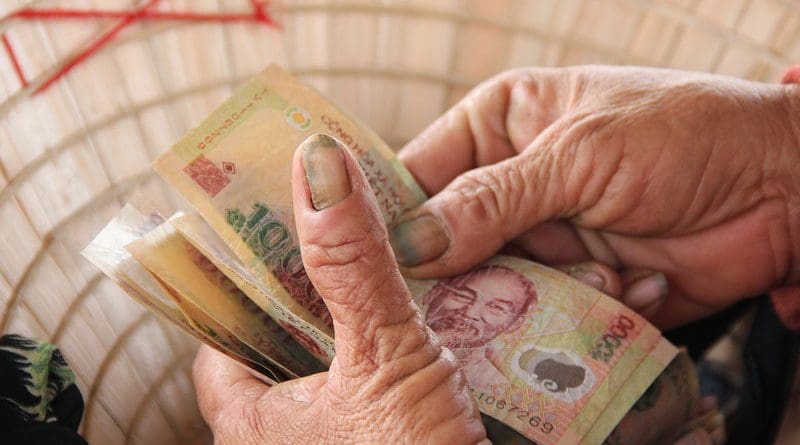Doi Moi’s Time Comes Again For Vietnam – Analysis
By Guanie Lim and Chengwei Xu*
In late August 2022, news broke that Apple was in talks to manufacture its famed Apple Watches and MacBooks in Vietnam for the first time. Some view this as a move by transnational corporations and their core suppliers to diversify their production away from China, buffering themselves from intensifying US–China geoeconomic competition.
Others interpret this as a sign of Vietnam’s deepening manufacturing prowess built on its famed 1986 doi moi(renovation) program. The reforms sought to reintegrate the country into the global economy. Among the more significant moves were the creation of stock exchanges, the promotion of private ownership and encouragement of private–public partnerships.
US–China relations are the talk of the town in recent times and various transnational corporations have relocated their facilities from China to adjacent economies such as Vietnam for reasons including, but not limited to, trade tensions.
But long-term overtures from other countries matter as well. Former South Korean president Park Geun-hye (2013–2017) lobbied hard to cement closer economic ties between Seoul and Hanoi. One of the most prominent ways she did this was by inviting the chaebols (large family-owned business groups) to invest in Vietnam.
While the chaebol-led investment was economically motivated, a less discussed factor is the backlash they faced in the Chinese market after Park decided to deploy the Terminal High Altitude Area Defence (THAAD) missile defence system. Any contemporary tourist strolling around Hanoi and Ho Chi Minh City would be hard-pressed to ignore the ubiquitous presence of these chaebols, ranging from consumer electronics brands (Samsung) to retail giants (Lotte Group).
Vietnamese economic planners have done their homework. The business environment has improved over the past decade. Vietnam progressed on the World Bank Ease of Doing Business Ranking from 98th in 2012 to 70th in 2020, leapfrogging other developing economies equally hungry to attract investment dollars.
One of the most concrete manifestations of Vietnam’s success is its industrial zones, without which no amount of overture to foreign investors would have borne fruit. In exchange for the soft and hard infrastructure facilities provided in these industrial zones, foreign transnational corporations establish a local presence and generate positive externalities — local employment and technology transfers — fuelling Vietnam’s export-oriented industrialisation.
The active cultivation of such industrial zones over the last decade coincided with some of Vietnam’s highest current account surpluses when transnational corporations began to use Vietnam as a regional business centre. Its much-improved current account means that the threat of a balance of payment crisis, the nightmare of many developing economies, has been consigned to the past.
Much remains to be done. Economists have long urged a fresh round of economic reforms, drawing inspiration from doi moi. Despite some positive developments, growth has slowed, particularly in recent years. A renewed focus on transforming Vietnam’s productive structure is needed.
A major component of this new doi moi would involve a more drastic restructuring of the country’s state-owned enterprises (SOEs). As part of Vietnam’s socialist roots, they are widely expected to spearhead the country’s industrialisation effort, especially in strategic sectors. But their performance is far from impressive, even in the post-1986 era.
Despite multiple rounds of administrative reforms, many of these SOEs remain plagued by inefficiency, mismanagement and poor export performance. Vietnam’s export revenue has been captured mainly by foreign investors. In early 2021, 76.3 per cent of exports were orchestrated by transnational corporations. Domestic business groups account for only 23.7 per cent of exports.
As is often the case with transition economies, deeper and more sustainable growth depends on how meaningfully the government can reorganise these SOEs to face the challenges of globalisation. Vietnam is no exception.
To harness the assets and goodwill of Vietnam’s SOEs the same companies should be subjected to more public scrutiny. Enhanced transparency will foster a greater understanding of their operations, limiting rent-seeking. More robust corporate governance is also likely to inspire investor confidence, helping the government fetch higher prices when it privatises these SOEs.
A related policy measure would involve providing Vietnam’s small and medium enterprises (SMEs) with more financial and technical assistance. Unlike SOEs, they are unburdened by administrative prerogatives and other ‘social functions’ — making them nimbler and more responsive to market forces. But SMEs typically lack capital and technology, so they need support to ensure vitality.
Vietnam should explore well-designed support programs to better integrate these enterprises into the production networks of SOEs and foreign transnational corporations — especially in export markets. The country’s motorcycle industry has witnessed substantial technological deepening following the efforts of Japanese transnational corporations to leverage Vietnam as an export hub.
The challenge now is to formulate closer cooperation between foreign and local companies in other export-oriented industries. Export targeting stimulated organisational learning and broader technological linkages in Asia’s earlier generation of latecomer economies.
Small- or medium-sized economies like Vietnam cannot realistically sway geopolitical tensions at the international level. Vietnam needs long-term policymaking geared towards acquiring product and process know-how — both of which are crucial to raising competitiveness. Its experience might provide lessons for other East Asian states trying to implement policies compatible with their socioeconomic conditions while managing the fallout of the US–China geoeconomic rivalry.
*About the authors:
- Guanie Lim is Assistant Professor at the National Graduate Institute for Policy Studies, Japan.
- Chengwei Xu is Research Fellow at the Nanyang Centre for Public Administration, Nanyang Technological University, Singapore.
Source: This article was published by East Asia Forum

